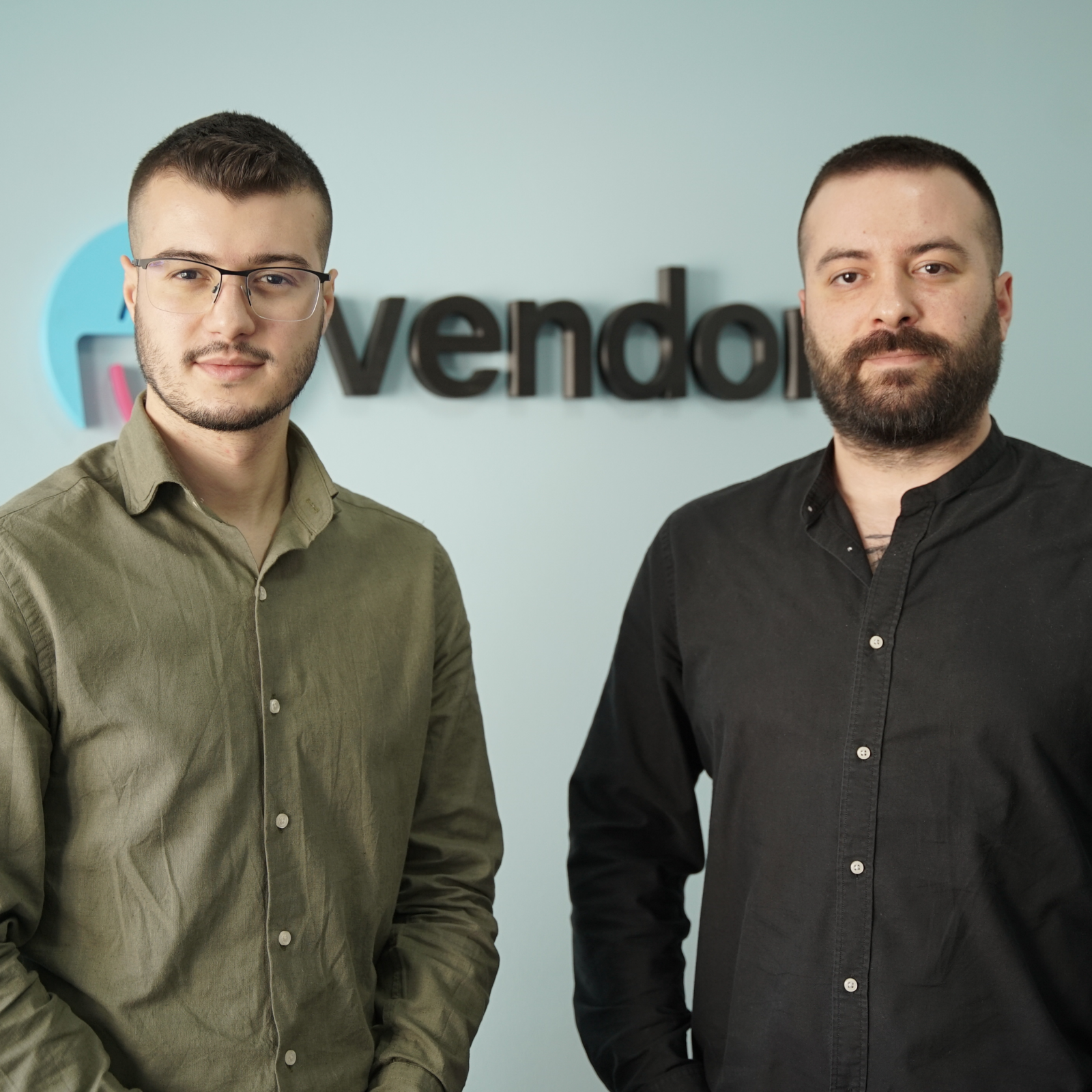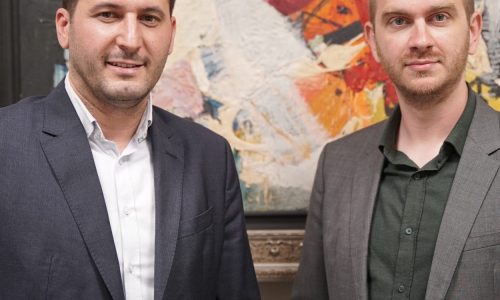The article is part of the ".mk startup of the month" initiative of IT.mk and Startup Macedonia. Every month, we carefully select and highlight one .mk startup on its way to success.
.mk Startup of the Month [March, 2024]:

What is a Vendor?
Vendor is a platform that enables rapid creation of e-stores. In addition, it empowers companies and individuals with all the necessary tools to build any type of e-commerce infrastructure and to sell online.The philosophy behind Vendor is quite simple – help if you can and where you can. For the two brothers behind the startup, Dejan and Boban Milosavleski, this way of thinking also serves as the foundation on which this e-commerce ecosystem platform is built.
“Vendor enables efficient networking of individual processes found in a business, whether it is online or offline physical sales, and facilitates the work of all vendors, business teams and brands in general,” this is how Dejan, the younger of the two, explains the startup.

Vratnica and the “Golden Book of Steroids”
The beginnings of Vendor can be traced to the Tetovo village of Vratnica, the birthplace of Dejan and Boban. Since both are developers, their common interest led them to make entrepreneurship their way of life.
“We wanted to earn some money, and the first thing that came to mind was printing T-shirts. However, we decided to go a step further and see if we could apply ourselves and do something that’s larger in scope. This has been our way of thinking since we were kids, and we wanted to be innovative and work on various challenges. So, we said: let’s do something that’s useful to a lot of people. We didn’t need to attend business school or anything to realize that a business can only prosper if it solves a problem,” explains Dejan, who also serves as the company’s CEO.
Although there were no entrepreneurs in the family, both of them felt the urge to build something of their own since they were students. Their first creation was, as they put it: “The Golden Book of Steroids”, i.e. the Business Catalog. This platform also allowed them to start digitizing businesses from western Macedonia.
“We delved deeper into the whole digitization of western Macedonia and made a product that lists businesses not only with a phone number and address, but also with a professional photo. We saved up some money and bought a camera worth 24 thousand denars (around 400 euros). Then, we started taking pictures left and right. It didn’t take long for this to turn into a serious photography industry. We got ahold of a large number of photos and the first week alone, we had about 40 clients,” says Dejan.
In addition to the catalog, their clients also started inquiring about the possibility of website development, which led them to the next step.
“It wasn’t long before we started making websites for said clients. We also started to delve into web development more seriously,” Dejan says, adding that this was also the period when they founded the IT company that is now behind Vendor, i.e. the digital agency Altius.
Richard Orlinski and the impact of the COVID-19 pandemic
In the following years Altius grew, gaining clients from the ranks of Richard Orlinsky, one of the most famous post-modern sculptors of today.
The cooperation with Orlinski was a turning point and paved the road to the next brave new chapter for their business.
One day, the team faced a purchase error regarding a million-dollar sale for Orlinski, and they had to deal with a 300 thousand euros worth of refunds. The reason, however, was that the platform they were using at that moment could not handle properly too many requests.

“It was at that point that Boban said that we should either act or be prepared to deal with the aftermath and risk a setback. That happened in 2019 and it was the year that we said enough is enough and we should shift our gaze towards making something of our own”, says Dejan.
What came next was their full dedication to the development of Vendor as a platform. And it was the COVID-19 pandemic that gave them a much-needed momentum.
“It feels weird to put it in such words, but COVID-19 gave us a head start in digitizing our clients’ companies. In a way, Vendor was a blessing in disguise because when you have a global digitalization movement, it goes without saying that you too will also hop on that train,” adds Dejan.
While, as they both say, they did not reinvent the wheel, making Vendor was still a very intensive process.
“We needed to set so many processes into motion and solve all the issues with the required integrations. In the beginning, we didn’t have investors or mentors, so we were led by our own experiences. We have worked on over 500 e-commerce sites, so we needed to see what the competitors have and what we can learn from that and then properly implement. We got the ball rolling, we struggled and, yet, we still did make the algorithms. We were about 20 programmers in the first year and we were constantly testing the waters in those early stages of development” says Dejan.
In 2021, Vendor officially hit the ground running as a SaaS startup. To register it as a legal entity though, Dejan had to leave Altius. For a span of six months, although he was technically unemployed, he still managed both of the companies – Altius and Vendor.

“I had to run two companies at the same time, one was waiting to be greenlit while the other was working at full steam. But, on the other hand, I had no health insurance, which, in a way, paints a perfect picture about the reality of the startup world in Macedonia,” he explains.
To launch or not to launch – the first client and the additional challenges
Regarding Vendor’s managing structure – Dejan is in charge of the technical part of the processes in Vendor, while Boban manages the sales and marketing part.
The Macedonian clients that reach out to Vendor are usually new commercial companies that want branding, marketing and their own e-stores. The first customer came from their immediate network, and as Dejan recalls, the whole endeavour resulted in a heated debate about whether to launch the platform or not.
“We launched a campaign and we managed to sign contracts with 4 out of 10 clients that reached out to us in the first week,” says Dejan, adding that as they got new clients, they also learned to adapt to new requirements. However, he’s quick to add that too much adaptation is never a good thing.
“When you make a product, you cannot adapt to the needs of every single customer. As a result, our development of the platform suffered. We had a client who, in addition to the e-shop, wanted to create their own corporate website, so we had to make that functionality possible as well. Then we made a product aggregator for that client, which added another 6-7 months to our development time. When you adapt, customers will praise you, but that’s exactly when you lose sight of the big picture. This was one of the biggest lessons we learned,” explains Dejan.
Such mistakes forced some members of the team to leave – another pivotal lesson about the challenges in the startup world.
“They were not satisfied and failed to see the results. We were working on too many features, we could never get to production, we just couldn’t celebrate our accomplishments. And it is very important to be able to look back and see what you have achieved,” Dejan emphasizes.
At the moment, both Boban and Dejan are more than happy because each new campaign brings them more and more clients. This, in turn, also allows their clients to sell, and their own big picture – is the creation and development of a Macedonian e-commerce ecosystem.

“We have a product that works and simplifies things for someone. Furthermore, we have managed to achieve what we have imagined. This gives us an incentive to continue with our mission, because our ideology is to solve problems. Our gaze was shifted on Macedonia form the very start because we are a country that sorely needs this kind of innovation,” Dejan points out.
Creating an e-shop in less than a minute
How much does it take for a new seller to open their e-store through Vendor? According to Dejan, the initial setup can be done in less than a minute.
“The entire infrastructure, from a technical point of view, is built in 50 seconds. We make it possible to create an e-shop that adheres to all standards and with all functionalities. The whole idea for creating an e-store was automation and an having an algorithm of modules with over 50 e-commerce components. These components can then be combined in numerous variations and in different styles,” Dejan explains.
Of course, there is also the desire to implement new technologies such as augmented reality (AR).
Furthermore, Vendor does not stop at the simply providing tools for the creation of the e-store. It also serves as “an extension cable to which a variety of third-party systems can be connected – CRM, ERM systems that have inventory access, or the largest software in the industry.”
“We have a passion for augmented reality and it feels very natural to bring that to Vendor. For example, to provide an AR look on more expensive wristwatches and so on. This and similar tools would be provided to our clients so that they could use them however they see fit” he muses.
Because of the ease with which this process is completed, many people think that there is a team of dozens, if not hundreds of employees behind Vendor. But this couldn’t be further from the truth.

“We have about 12 employees, and people think we have about 100. Three teams are working on technologies and marketing, and together with the outsourcing team, the company consists of about 20 people,” he adds.
Recently, they also g ot an angel investment worth 60 thousand euros. From the very beginning, the development was completely through bootstrapping (investing own funds) and they did not think seriously about contacting investors. This was the case, until push came to shove and they were forced to rethink their strategy.
“With bootstrapping it is possible to reach some kind of MVP (minimum viable product) but realistically, everything else is impossible. So, every 2-3 months we considered the possibility of investors, and, having that goal in mind, we went to the startup weekend in Ohrid. We didn’t even have a presentation, and we had to make one on our way there. After making a lot of contacts during the startup weekend, we still found it somewhat as an unreal process, but we did found potential investors. Now we are working to secure more investment and we are threading forward with foreign investment funds. The gist of the story is that you can’t do it alone and you need help from various people and experts,” emphasizes Dejan.
Investors’ expectations are different. Although to some extent they might seem laid back and it is also expected from those investors to be active and to help in terms of networking and finding contacts.
“We expect to have good communication and a team that will lead us to the next investment and expansion to foreign markets,” Dejan says, emphasizing that Vendor’s ultimate goal is not to be the superior e-commerce platform, but to be bought out by some of the industry giants.
“We don’t want to fight with the giants. On the contrary, we want to give Vendor to the said giants and mend their issues- so the end goal can be a buyout by companies like WooCommerce, Shopify and the like,” he adds.
A dart board entertaining no one
Regarding the tech and startup ecosystems in Macedonia, Dejan points out that there is talent in the country. But he feels that young people still have somewhat unrealistic expectations about what it is like to work in the IT industry.
“Nowadays, young people are quick to give up, especially if they don’t see immediate results or shortly after making a commitment. An outlook like this creates serious problems for our IT community. You can’t hire young people for a serious project that needs experience, and no one is willing to do what’s necessary to become experienced. It’s the same with entrepreneurs – they give up easily, while the whole idea of the startup world is that you constantly work and struggle to achieve growth and success,” he says.
In addition, he feels that all that big talk about earning thousands of euros as a programmer is actually harming businesses like Vendor. As a result, it becomes very difficult to find tenacious young professionals who are willing to stick through thick and thin.
“The startup community can help with the challenges and recruit adequate staff knowledgably in entrepreneurships and startups. People getting into this line of work need to know that when they enter a startup, they will not have a 1,500 euro salary and they will not have pool tables and darts boards. They need to be ready and willing to learn and adapt to reality. To think otherwise is foolhardy and it needs to change. Here in our office we have a dartboard as well, but nobody plays darts because they don’t have the time for that,” concludes Dejan.









